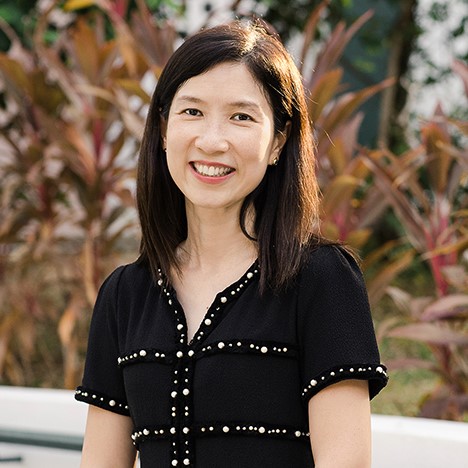Young Children’s Voices in Mathematical Problem Solving
Contributed by Dr Ho Siew Yin and Sng Wei Qin Abbie, from NTUC First Campus, for SingTeach Virtual […]
Read More
Originally planned as a blended face-to-face and virtual experience, the 10th Teachers’ Conference led by the Ministry of Education, Singapore had to quickly pivot to a fully online conference after stricter COVID-19 measures were announced. While having to address the immediate challenges faced by teachers due to the ongoing pandemic, the conference also seeks to reinforce the emphasis on enhancing classroom practice and lifelong learning. SingTeach speaks to Ms Tham Mun See, Executive Director of the Academy of Singapore Teachers, about the key objectives of the conference as well as the need for transforming the teaching practice to gear up for a more globalized and uncertain world.

The theme of the Teachers’ Conference and ExCEL Fest 2021 (TCEF2021) – Ignite Imagination, Empower Communities, Transform Practice – aims to meet three key objectives: to spark new ways of teaching and learning in a challenging world; to foster collaboration between the teaching fraternity; and to transform teaching practices for a post-COVID world.
In line with the objectives, TCEF2021 offers a wide array of learning experiences to help teachers equip students with skills for a fast-changing world such as self-directed learning. It also supports the shift to increasingly digital and technological classrooms. “The various Concurrent and Spotlight sessions, ExCEL Fest exhibition booths and poster presentations cover themes such as student wellbeing, differentiated instruction, inquiry-based learning, e-Pedagogy, home-based learning (HBL), Information Communications Technology and cyber wellness – all of which are relevant to both the immediate and post-COVID education landscape,” says Ms Tham.
She highlights the conference’s first keynote address by Dr Mary Helen Immordino-Yang for its timely message on why teachers should consider the role of emotional engagement in their teaching practices. She notes that the idea of learning and emotions being interconnected has always been a topic of interest among researchers.
“What this means for schools now is to make learning more relevant to the students and provide more opportunities for them to make meaning of their experiences,” she explains. “This is how we can guide our students to invent themselves and their possible futures.”
The importance of preparing students for the future is an imperative also shared by the Minister for Education Mr Chan Chun Sing. In his virtual address to the teaching fraternity at the conference, he shared a personal anecdote from his childhood.
He recalled how a teacher, whom he identified as a Miss Low of MacPherson Primary School, had encouraged him to finish reading a “more than 100-pages long” book from the library – a far cry from the picture books that he was used to.
That experience, he says, kindled his curiosity for learning and boosted his confidence. “The foundation of all competencies is the combination of curiosity and discipline,” he says, emphasizing the need to make curiosity and confidence as one of the cornerstones of 21st century competencies.
“There are three dimensions of confidence that we should be aware of: confidence to compete in a globalized world; confidence to accept ourselves; and confidence to chart our own path as a people,” he adds.
“What this means for schools now is to make learning more relevant to the students and provide more opportunities for them to make meaning of their experiences. This is how we can guide our students to invent themselves and their possible futures.”
– Ms Tham, on the role of emotional engagement in teaching practices
The pandemic has resulted in the acceleration of the use of digital technology in education. This shift reinforces the need for digital literacy education among students.
Touching on this issue, the second keynote address by Dr Helen Beetham (read more here) discusses the importance of digital resilience and cyber wellness among students. She reminds us that students have to be empowered with the necessary digital literacy competencies, such as creativity to create within a digital space and online communication skills, so that they can navigate the digital landscape safely and responsibly.
This means that it is pertinent for educators to be versatile in their pedagogy. Ms Tham notes that with HBL and blended learning becoming a mainstay in education today, teachers have to be adept at toggling between different modes of teaching as well as leveraging technology to transform their teaching practices.
“Dr Beetham’s address leads the way for us to better understand how technology can lead to new ways of thinking and how those ways of thinking can be intentionally taught or supported in our schools,” Ms Tham shares.
Ms Tham observes that the conference’s quick turn to an online format parallels the swift adaptation of HBL at the height of COVID-19 outbreak. It reflects the teaching fraternity’s commitment to embrace adaptability and flexibility as part of their skillset.
With more than 15,000 participants registering for the 260 live sessions as well as the Exhibition and Poster Gallery over the three days, Ms Tham shares that she is inspired by the enthusiasm shown.
“The presenters and participants found the online conference sessions to be interactive and engaging. We saw teachers interacting actively online in the virtual rooms, with breakout room ‘table’ discussions,” she says.
In particular, she highlights the Teachers’ Special which allows the teachers to have enriching discussions on what lies ahead for education, and how the role of the teachers must evolve to cater for new ways of learning. “When teachers look to the future and exchange perspectives, they inspire one another, foster a sense of fraternity and collectively shape the future they want to see. Nothing is more powerful than our teachers having a voice in how teaching and learning should evolve in the new education landscape,” she shares.